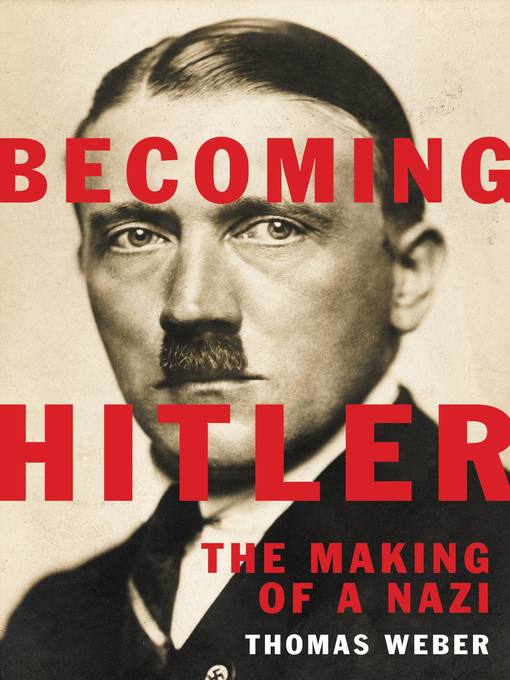
Becoming Hitler
The Making of a Nazi
کتاب های مرتبط
- اطلاعات
- نقد و بررسی
- دیدگاه کاربران
نقد و بررسی

October 1, 2017
Challenging the notion that Hitler was "merely an empty canvas that had been filled with the collective wishes of the Germans."German-born historian Weber (History and International Affairs/Univ. of Aberdeen; Hitler's First War: Adolf Hitler, the Men of the List Regiment, and the First World War, 2010, etc.) turns many assumptions on their heads in this incisive study of Hitler's improbable evolution and rise from 1918 onward. Contrary to his own narrative created in Mein Kampf about his war experience, as well as assertions by later historians, Hitler returned from the Western front in World War I with "still fluctuating political ideas" that "oscillated between different collectivist left-wing and right-wing ideas" and no real stance against the left-wing revolutionary movement gripping Munich, where he then was living. Refusing to be demobilized from the army that essentially took care of him, he actually served in the new revolutionary regime of Kurt Eisner, who was assassinated in early 1919, thus accelerating the city's radicalization and further move from democratization. Weber describes Hitler then as "a drifter and opportunist who quickly accommodated himself to the new political realities." The office of Vertrauensmann ("soldiers' representative") of his company was his first-ever leadership role, giving him "a raison d'etre for his existence." After the fall of Munich's "Soviet Republic" in April 1919, he became a "turncoat" and informant, rewriting his previous involvement with the revolutionary movement. Weber finds that the ratification of the Versailles Treaty on July 9 became "Hitler's Damascene experience," as he (and most other Germans) did not fully realize they had lost the war. Attending anti-Bolshevik training classes, and then becoming a propaganda lecturer himself, sparked the beginning of Hitler's political career, during which he emphasized questions of why Germany lost the war and how the country "had to reorganize itself to be safe for all times." Weber astutely examines how Hitler took anti-Semitism to its virulent "biologized form."Compelling research and original insights bring a fuller understanding to the mind and motives of the demagogue.
COPYRIGHT(2017) Kirkus Reviews, ALL RIGHTS RESERVED.

October 15, 2017
Similar to Hitler's First War (2010), Weber's (history, Univ. of Aberdeen) latest argues that historians should not assume that any of Adolf Hitler's autobiographical statements, whether they appear in Mein Kampf or elsewhere, contain any iota of truth. The author argues that when World War I ended, Hitler was not a traumatized war veteran whose ideology could be considered to be Nazism in a nascent form. Instead, the author asserts that in 1918, Hitler was a political opportunist--almost an empty vessel--who engaged with postwar Bavarian political culture and eventually crafted an image of himself as a self-made genius with a destiny to save Germany from a Judeo-Bolshevik conspiracy. Weber mines contemporaneous sources to re-create the physical milieu, including the city of Munich, along with the intellectual movements that fed Hitler's evolving political identity as he transformed from a relatively apolitical loner to a right-wing demigod. By 1926, Hitler had assimilated, and genuinely believed, racialist and anti-Semitic ideas. VERDICT While the details can become cumbersome at times, creating a narrative that is sometimes difficult to follow, this comprehensive work should become the standard text on Hitler and the origins of the Nazi party.--Frederic Krome, Univ. of Cincinnati Clermont Coll.
Copyright 2017 Library Journal, LLC Used with permission.

Starred review from September 1, 2017
What influences forged the world-shaking demagogue Adolf Hitler? Biographers misled by the dictator's own lies long supposed his political character emerged during his early years in Austria. Later scholarsstill misled by Hitler's fabricationshave pointed to the formative influence of an angry private's travails in WWI and its aftermath. But when Weber looks at the Hitler who returned to Munich in 1918, he sees only an aimless drifter. Carefully tracking his life from 1918 to 1926, Weber documents the transformation that turned this rudderless opportunist into a fiery orator enjoying the support of millions who hailed him as a political genius, even a messiah. To a surprising degree, this metamorphosis depended on Hitler's success in hiding his realand belatedpolitical awakening behind a heroic personal mythology. Much of that mythology appeared in 192526 in Mein Kampf, but so, too, did an ominous political agenda: Hitler promised the world he would secure Germany's future by ridding the country of Jews and by securing Lebensraum in Eastern Europe. This probing study concludes with the definitive maturation of a true Nazi leader, fully committed to a political vision that would kill millions in the Holocaust and millions more in world war. An unflinching inquiry.(Reprinted with permission of Booklist, copyright 2017, American Library Association.)

























دیدگاه کاربران